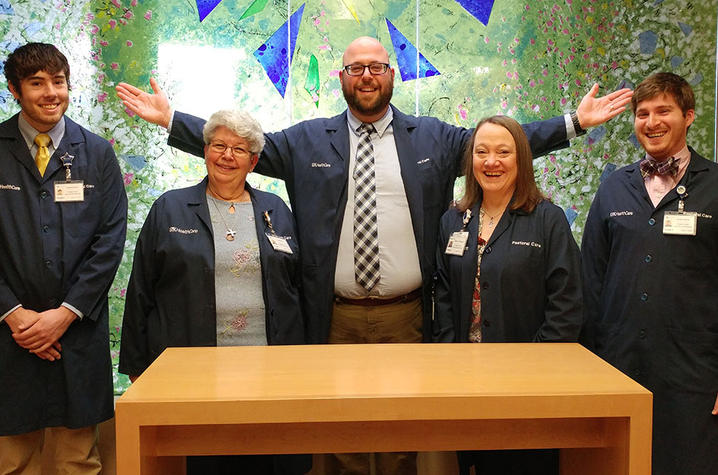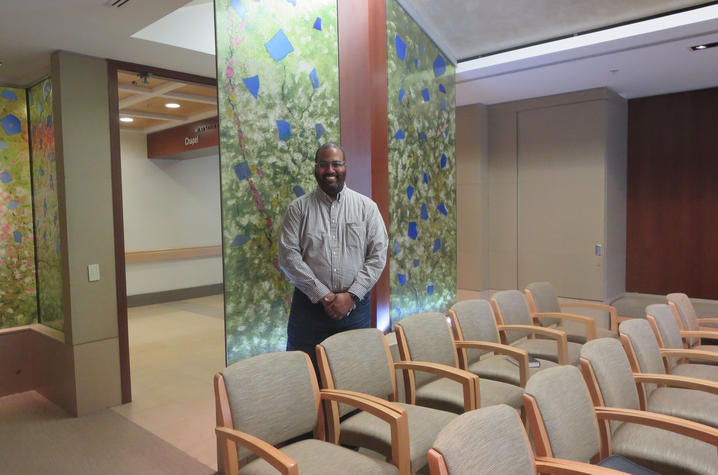UK Pastoral Care Internship Program Prepares Chaplains to Be a Source of Calm and Strength
LEXINGTON, Ky. (Jan. 27, 2017) – When Mark Dunn arrives at the University of Kentucky Chandler Hospital for his shift as a hospital chaplain, he first heads over to the Emergency Department (ED) to check on the trauma cases from the night before. He’ll follow-up with patients that have requested a chaplain. He makes a point to check in with the staff and observe how emotions are running that day. He may offer support to a family in the midst of the chaos that often accompanies trauma, making sure the right information gets to the right staff member. The sense of calm he brings to the situation frees up the medical staff to focus solely on saving lives.
Once Dunn feels comfortable leaving the ED, he walks to the 10th floor and starts making his way down, floor by floor, unit by unit, repeating the process of being a presence for people in need of a sounding board, helping them to make sense of a devastating diagnosis, or provide a prayer, if requested.
Though quiet and unassuming, Dunn thrives on the connections he makes with people, his favorite part of being a hospital chaplain. He has a soothing voice and gentle demeanor, but perhaps his strongest skill is that he is a good listener, all traits he didn’t realize he possessed until he joined UK’s Association for Clinical Pastoral Education (ACPE) internship program, which he took as part of his Master of Divinity studies.
ACPE was established in 1967 and UK is among the founding accredited Clinical Pastoral Education Centers. CPE programming at UK HealthCare was inactive only a few years around 2010, while UK HealthCare and its Pastoral Care Services department added several full time and well-trained staff chaplains. Rev. Joe Alverson is currently the director whose vision has helped grow the Pastoral Care Program. When Rev. Dr. Cam Holzer was hired as ACPE Supervisor and Clinical Pastoral Educator in 2013, she worked to revive the program so that new CPE students and programs could learn and serve within this larger, more utilized and seasoned chaplaincy team.
Holzer says the internship program is designed to facilitate personal, pastoral and professional growth. The internship is a 400-hour training made up of 100 hours of structured educational class time and 300 hours of direct care service. Each intern works with staff chaplains as mentors and is assigned to specific floors or clinical areas of UK HealthCare, serving as primary chaplain for their areas during their time at UK. Interns learn their way around the hospital and become familiar with staff as they walk the hallways every day. Once an intern is equipped to carry an on-call pager, they may be called to a variety of urgent pastoral situations.
“They learn the skill of showing up and making themselves available,” Holzer said. “There is no way to know what it is they are getting called to; they have to listen, care, trust their intuition, and grow in more effective communication to learn what that person needs and how to help provide it. It could be a prayer, to mostly listen, or the person may need to have someone there with them and talk very little or not at all.”
For some students, the clinical internship is a requirement of their Masters of Divinity degree and for others, it is an elective. Also, seasoned clergy and lay persons take CPE to deepen in both their self-knowledge and their pastoral care capacity. With a thoughtful process of mutual discernment in place to determine if CPE at UK HealthCare and an applicant are a good match for each other, the program is open to persons of all faiths and backgrounds, and ages range from 25 to 75.
“When I interviewed for the internship, I was nervous because I don’t like talking about myself,” Dunn said. “I had no experience and didn’t even understand the chaplain’s role in a hospital. Over the course of the internship, I learned I was a people person and enjoy talking with others. I learned how to listen, to meet people where they are, one on one, in depth, to be the presence they need at that moment in their life”
After completing the internship in 2014, Dunn served for a while as a PRN (relief staff) chaplain at UK. He then completed a one-year chaplain residency at Norton Hospital in Louisville, and soon afterwards Dunn made his way back to UK, hired full-time in 2016.
Students who complete CPE internships usually go on to be PRN chaplains, full-time hospital chaplains, pastor churches, or work in nursing homes and social care settings. In most any context, the student will hopefully have new skills and capacity to more deeply hear and helpfully attend to others in an array of settings for the rest of their lives, thus multiplying the scope of care provided.
“Interns learn more about the art of spiritual assessment, the ability to open their heart and listen, paying close attention to learn what is uniquely going on with the person before them, whether it be the patient, a family member, or UK staff. They learn from their own emotions and experiences how to honor and respect others in their feelings,” Holzer said.
“The hope would be that they develop their own way of being more fully in the world, and more attentive, compassionate and effective in their ministry.”






